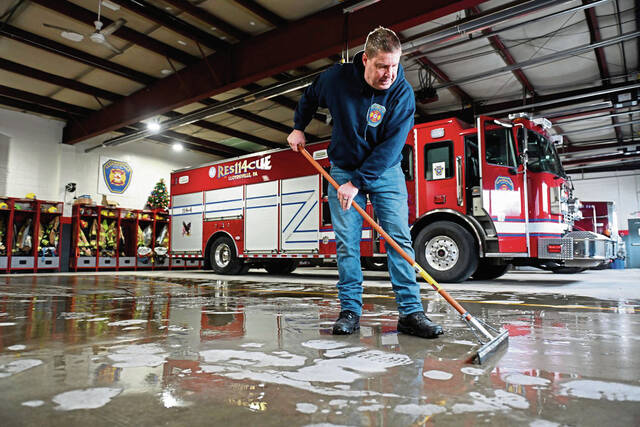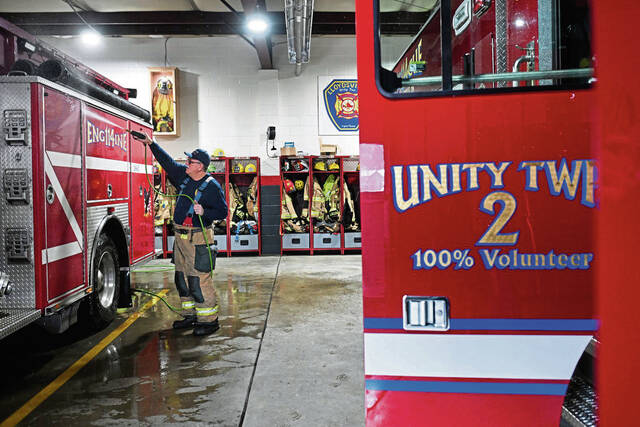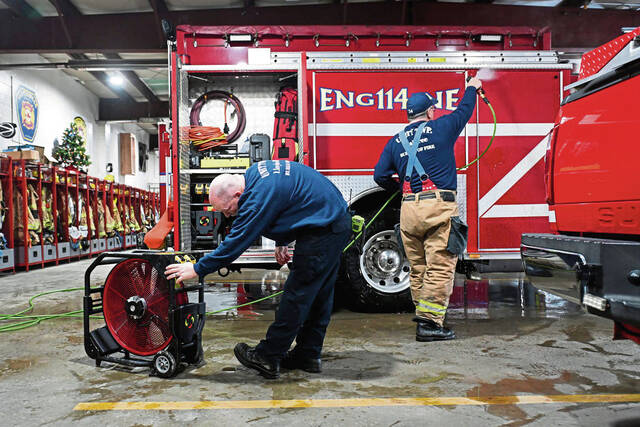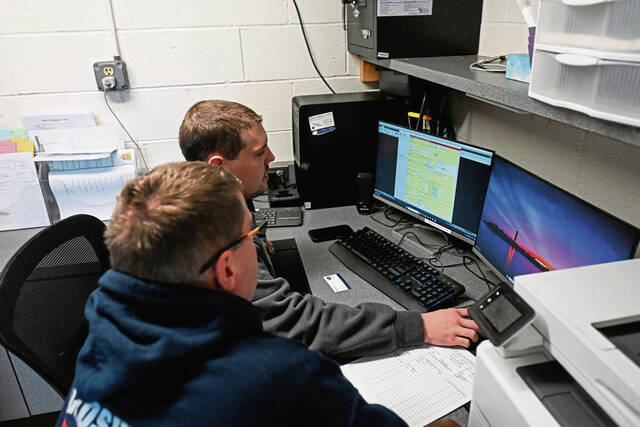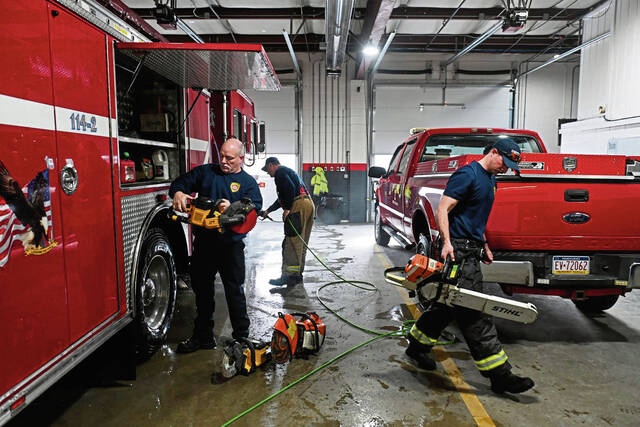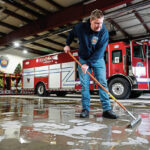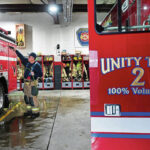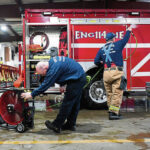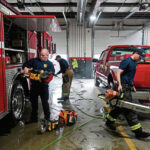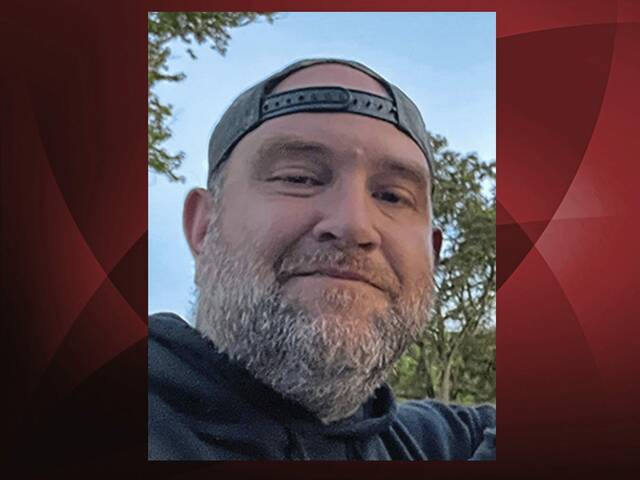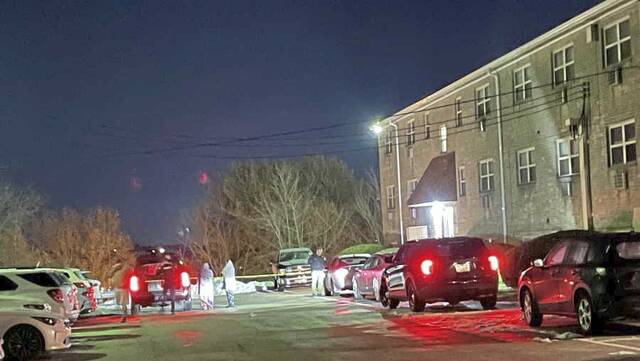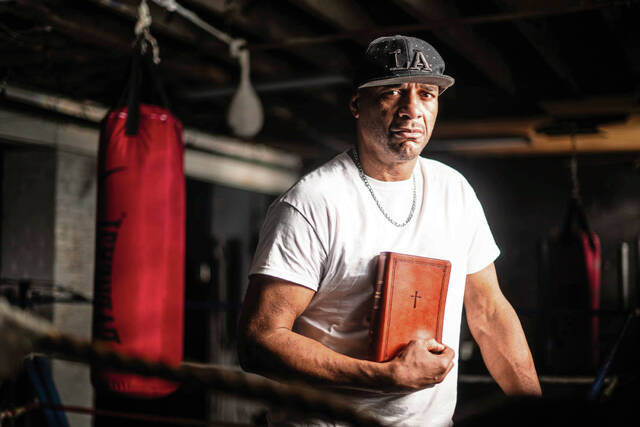Firefighters from the Lloydsville and Crabtree stations in Unity had a head start last year when they answered a weekday call for a car crash on Donohoe Road.
“We had a crew out the door within 30 seconds, they were on the scene within three minutes, and they had the occupants extricated within 10 minutes,” said Shawn Reagan, chief of a station in Youngstown that is part of the Unity Township Bureau of Fire.
That quick response, Reagan said, was possible because of the bureau’s daytime duty crew program that just completed a six-month trial period and is continuing in 2025.
With paid firefighters ready to go at a station, the fire bureau can count on a prompt response time during the day when many volunteers are working.
Even volunteers who are at home when an emergency call comes in will need extra minutes to drive to the fire hall, get their gear ready, board a fire truck and depart from the station, Reagan noted.
“We’re beating our previous out-the-door times conservatively by five to six minutes,” he said.
The program has two of the bureau’s seven otherwise volunteer fire stations staffed with paid daytime crews on weekdays, including a fire truck driver and a second firefighter at each of the sites. Optimally, the crews will staff one fire station to the north and another to the south of Route 30, which runs on an east-to-west line through the township.
Firefighters scheduled for a daytime shift receive a stipend of $12 an hour.
“It’s been pretty successful for us,” said Reagan, one of two co-administrators of the program. “Our main objective is to get on the scene in a timely manner and start the mitigation process while the other volunteers are on the way. For larger incidents, we truly rely on our volunteers.”
During July, the first month of the trial, the daytime duty crews responded to 33 calls with an average time of one minute and 30 seconds from being dispatched by 911 to heading en route and an average time of five minutes from starting en route to arriving at the scene.
The bureau was working to compile statistics for the entire six-month trial.
“It has been such a successful program,” said Mike O’Barto, chairman of the township supervisors. “We are quite pleased with being able to have more public safety in our municipality during the day, when most of the volunteer firefighters are working.”
Life-saving response times
Bill Watkins, Crabtree fire chief and co-administrator of the Unity duty crew program, cited additional emergencies where those crews made a decided difference — including a one-minute response to a propane gas leak at a Crabtree church and an assist with a garage fire that was knocked down within two minutes in neighboring Derry Township.
“We’ve had several medical incidents where, no doubt, they saved a life with the quick response,” Watkins said.
The duty program provided a backup level of fire protection in Unity in December, when emergency responders worked to locate 64-year-old Elizabeth Pollard — a resident of the township village of Marguerite who fell through a nearby sinkhole into an abandoned mine and died.
“Five of the seven Unity departments were on that scene the entire night and entire day, and we still kept two stations staffed with duty crews as they had been scheduled,” Watkins said. “We had everything else in the township covered while the rest of us were out there working.”
When not responding to emergencies, the duty crews have been maintaining equipment, completing training and handling public relations details — including presenting fire safety programs at schools and day cares.
The bureau also intends to initiate a pre-planning effort that will allow firefighters to assess conditions at participating businesses, churches or other major facilities so they’ll know in advance the layout of such buildings in the event they get called there to handle an emergency.
“Our plan for the winter months is to start putting crews on walk-throughs of different businesses so they can see where all the (utility) shut-offs are, where the hydrants are placed and where the alarm system is,” Watkins said.
Firefighters also will note the number of staff expected to be in a particular building, the structure’s dimensions and whether any hazardous chemicals may be present.
“We’re going to map it out and make a pre-plan,” Watkins said. “We’ll have a phone app. When we hit the call location, everything will come up, and we’ll know what we’re working with.”
A Unity duty crew member can be scheduled for a shift of five hours or 10 hours on a given day.
“It all depends on scheduling around their jobs and their family life,” Watkins said.
Participation in the program has roughly doubled over the six months and is now at about 40, the maximum crew numbers that can be supported by the bureau’s budget.
“We want to continue to expand on the program, maybe work in some weekend and evening coverage depending on what our budget allows,” Reagan said.
Administrator considered
For 2025, Watkins said, the program budget is set at about $140,000, including possible hiring of a dedicated administrator to handle scheduling, payroll and other tasks. That would free himself and Reagan to concentrate on their duties as station chiefs.
The township levies a 2-mill fire tax on real estate, which annually generates about $613,000 to support the fire companies and enhance firefighting resources.
The Unity fire bureau has hopes of obtaining additional funding by applying for a federal SAFER (Staffing for Adequate Fire and Emergency Response) grant, Watkins said. That could cover costs of an expanded duty crew program for several more years, he said.
“We want to enhance the program,” he said. “Every year, we want to move another step forward, making it better for the community and for the participants.”


